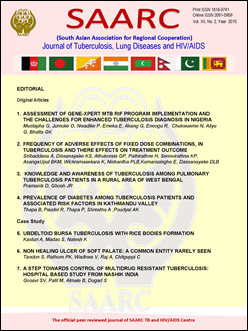Assessment of Gene-Xpert MTB RIF Program Implementation and the Challenges For Enhanced Tuberculosis Diagnosis in Nigeria
DOI:
https://doi.org/10.3126/saarctb.v12i2.15948Keywords:
Gene-Xpert, Implementation, Challenges, NigeriaAbstract
Introduction: Gene-Xpert MTBRIF, rapid tuberculosis and rifampicin resistance diagnostic technology is implemented in Nigeria to enhance public health response to tuberculosis diagnosis in HIV patients with presumed tuberculosis (TB), and presumed cases of drug resistant TB. The aim of the paper is to share experience on programmatic issues on Xpert MTB RIF roll-out.
Methodology: Program implementation data from 22 Xpert laboratories for period between September 2011 and December 2013 were analyzed to evaluate outcomes and identify challenges and opportunities for strengthening tuberculosis detection in Nigeria.
Results: A total of 12249 patients received single gene-Xpert test at 10 secondary (S), 10 Tertiary (T) and 2 private (P) health facilities over 25 months. The tests were valid in 10948 patients, and 3669/10948 (33.5%) were positive for Mycobacterium tuberculosis (MTB). In 815/3669 (22.2%) of the MTB cases, the bacteria were resistant to rifampicin. Rifampicin resistance was inconclusive (indeterminate) in 509/12249 (4.2%) while the test failed in 792/12249 (6.5%). The program was noticeably limited to health facilities above primary centers; there were prolonged delays in the diagnosis and treatment with limited on-site synergy between TB/HIV services. Reducing diagnostic delays and integrating TB/HIV services into the gene-Xpert program will enhance early case detection and enrollment for care in Nigeria.
Conclusion: The model Gene-Xpert MTBRIF program implemented in Nigeria targets specific risk groups with high number of cases detected. Diagnoses of tuberculosis and resistance to rifampicin could be enhanced by offering integrated TB/HIV services; improving patient and sample flow/referral; proper documentation of test outcomes and alignment with DR-TB management.
SAARC J TUBER LUNG DIS HIV/AIDS, 2015 XII (2), page: 1-7
Downloads
Downloads
Published
How to Cite
Issue
Section
License
Copyright © SAARC Tuberculosis and HIV/AIDS Centre (STAC), all rights reserved, no part of this publication may be reproduced, stored in a retrieval system or transmitted in any form or by any means without prior permission of the STAC.




